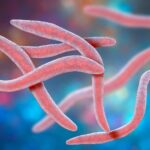• Gene expression
• Microbiota-mediated changes
What is already known on this topic
For decades, scientists have been studying the diversity and the composition of the gut microbiota. But to date, little is known about how gut microbes influence intestinal homeostasis under healthy and disease conditions.What this research adds
By studying conventionally raised mice and mice raised in the absence of microbes, researchers found that exposure to commensal microbiota caused changes in the activity of specific DNA regulatory elements, which activated a set of genes that maintain intestinal homeostasis. Acute inflammation resulted in changes in methylation of regulatory DNA elements, leading to alterations in genes linked to colitis and colon cancer.Conclusion
The findings shed light on how gut microbes influence the equilibrium of the gut under normal and acute inflammatory conditions, showing that microbiota-induced changes in gene expression are necessary for proper gut function.
DNA methylation is a biological process that causes gene expression changes and is thought to play a key role in the microbiota-gut interaction and in the development of inflammatory bowel diseases. Now a study in mice revealed that exposure to gut microbes can change the activity of specific DNA regulatory elements, activating genes that either maintain intestinal homeostasis or promote inflammation.
“The intestinal microbiota regulates intestinal physiology by modifying host gene expression throughout the intestine, but the underlying mechanisms have remained uncharacterized,” the researchers say. The new study, published in Nature Microbiology, sheds light on how gut microbes influence the equilibrium of the gut under healthy and disease conditions.
Recent research showed that the microbiota can regulate gene expression of several intestinal immune cells, and DNA methylation is known to play an important role in controlling gut homeostasis and differentiation. Methylation can change the activity of a DNA segment by affecting protein binding and the DNA tridimensional organization, without changing the DNA sequence.
Using conventionally raised mice and mice raised in the absence of microbes, Yehudit Bergman at the Hebrew University Medical School in Jerusalem and her colleagues set out to analyze the impact of the microbiota on DNA methylation of the cells that line the gut.
Gene expression
Global methylation levels were reduced in gut samples from conventionally raised mice compared to samples from germ-free mice.
In the gut samples, the team identified low-methylated regions, which represent active regulatory DNA segments. Samples from conventionally raised mice contained about 93,000 low-methylated regions, whereas samples from germ-free mice had only about 57,000 of these regions.
The low-methylated regions were enriched in binding sites for transcription factors that play an important role in gut development, cell proliferation, inflammation, cell migration, and cell death. What’s more, most of the 300 genes that were upregulated in conventionally raised mice are generally involved in protecting the gut from inflammation. This finding suggests that exposure to commensal microbiota leads to the activation of a set of genes that drive normal intestinal homeostasis, the researchers say.
Microbiota-mediated changes
Next, the researchers caused intestinal damage and inflammation to conventionally raised mice. Global methylation levels were reduced in the gut samples from these mice, and acute inflammation resulted in changes in methylation of regulatory DNA elements, leading to alterations in genes linked to colitis and colon cancer.
To find out if the changes observed in conventionally raised mice with colitis were due to increased bacterial exposure, the team caused intestinal damage and inflammation to germ-free mice. Only 5% of the genes affected in conventionally raised mice with gut inflammation were affected in germ-free mice with colitis, suggesting that the expression changes observed upon intestinal damage is due to the microbiota.
The study, the researchers say, shows that microbiota-dependent regulation of genes in intestinal cells is associated with changes in DNA methylation. This, the team adds, “provides another important layer in the regulation of intestinal host genes involved in physiology and human disease.”











